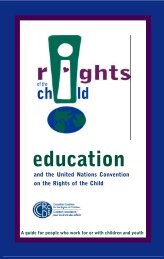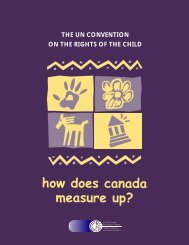CCRC report on rights of children in Canada - Canadian Coalition ...
CCRC report on rights of children in Canada - Canadian Coalition ...
CCRC report on rights of children in Canada - Canadian Coalition ...
You also want an ePaper? Increase the reach of your titles
YUMPU automatically turns print PDFs into web optimized ePapers that Google loves.
ecognizes the role <strong>of</strong> the family and the resp<strong>on</strong>sibilities <strong>of</strong> parents, puts c<strong>on</strong>siderable emphasis <strong>on</strong> the<br />
state’s duty to support <strong>children</strong> and their “families,” to enable the healthy development <strong>of</strong> all <strong>children</strong><br />
with<strong>in</strong> their jurisdicti<strong>on</strong>. Preventive social services for families with <strong>children</strong> need to be higher priority<br />
<strong>in</strong> programm<strong>in</strong>g and prov<strong>in</strong>cial and territorial budget<strong>in</strong>g for child welfare.<br />
Summary<br />
In general, young people stated that they want to see fair and c<strong>on</strong>sistent policies for themselves, their<br />
peers, and future <strong>children</strong> <strong>in</strong> care. They also want to be active participants <strong>in</strong> decisi<strong>on</strong>s that affect them<br />
directly, changes with<strong>in</strong> the system, and educati<strong>on</strong> <strong>in</strong>itiatives for adults who work with <strong>children</strong> <strong>in</strong> care<br />
and the general public. They want to share stories <strong>of</strong> success and hope.<br />
To make this happen, young people recommended that all stakeholders, <strong>in</strong>clud<strong>in</strong>g youth <strong>in</strong> care<br />
networks, child and youth advocates, child welfare agencies, and government <strong>of</strong>ficials, work together<br />
to identify and implement good practices that are c<strong>on</strong>sistent with the general and specific provisi<strong>on</strong>s <strong>of</strong><br />
the C<strong>on</strong>venti<strong>on</strong>.<br />
Recommendati<strong>on</strong>s<br />
ACTION<br />
Immediately resolve the <strong>in</strong>equitable fund<strong>in</strong>g dispute<br />
with regard to child welfare services for First Nati<strong>on</strong>s<br />
<strong>children</strong> under federal jurisdicti<strong>on</strong> and take other<br />
necessary steps to ensure equitable treatment <strong>of</strong><br />
all Aborig<strong>in</strong>al <strong>children</strong> <strong>in</strong> relati<strong>on</strong> to n<strong>on</strong>-Aborig<strong>in</strong>al<br />
<strong>children</strong>.<br />
C<strong>on</strong>vene a meet<strong>in</strong>g <strong>of</strong> federal, prov<strong>in</strong>cial, and<br />
territorial social services m<strong>in</strong>isters as so<strong>on</strong> as<br />
possible (<strong>on</strong>e has not been held s<strong>in</strong>ce 2006) and<br />
beg<strong>in</strong> a nati<strong>on</strong>al review <strong>of</strong> child welfare standards<br />
and practices to ensure equitable treatment for all<br />
<strong>children</strong> and protecti<strong>on</strong> <strong>of</strong> their C<strong>on</strong>venti<strong>on</strong> <strong>rights</strong>,<br />
with particular attenti<strong>on</strong> to mental health services.<br />
Use the <strong>in</strong>ternati<strong>on</strong>al Guidel<strong>in</strong>es for the Alternative<br />
Care <strong>of</strong> Children and General Comments 11 (<strong>rights</strong><br />
<strong>of</strong> <strong>in</strong>digenous <strong>children</strong>) and 13 (child protecti<strong>on</strong>) as a<br />
basis for the review. The review would also identify<br />
and expand good practices <strong>in</strong> care, tra<strong>in</strong><strong>in</strong>g, and<br />
m<strong>on</strong>itor<strong>in</strong>g outcomes.<br />
Actors (Lead and Ma<strong>in</strong> Actors)<br />
Aborig<strong>in</strong>al Affairs and Northern<br />
Development <strong>Canada</strong><br />
Justice <strong>Canada</strong><br />
Human Resources and Skills Development<br />
<strong>Canada</strong><br />
Prov<strong>in</strong>cial/territorial departments <strong>of</strong> social<br />
services<br />
The review process should <strong>in</strong>clude<br />
prov<strong>in</strong>cial/territorial child and youth<br />
advocates, networks <strong>of</strong> youth <strong>in</strong> care, and<br />
n<strong>on</strong>-governmental agencies who work<br />
with youth from care <strong>in</strong> the community<br />
ACTION<br />
Engage urgently <strong>in</strong> dialogue with Aborig<strong>in</strong>al<br />
community leaders to identify immediate practical<br />
steps to reduce the over-representati<strong>on</strong> <strong>of</strong><br />
Aborig<strong>in</strong>al <strong>children</strong> <strong>in</strong> child welfare <strong>in</strong> all prov<strong>in</strong>ces.<br />
Focus attenti<strong>on</strong> <strong>on</strong> the reality that a high number<br />
<strong>of</strong> Aborig<strong>in</strong>al <strong>children</strong> leave the child welfare<br />
system without attachment to a supportive,<br />
substitute “family.” Follow up with l<strong>on</strong>ger-term,<br />
more susta<strong>in</strong>able good practices.<br />
Give top priority to permanency plann<strong>in</strong>g for<br />
<strong>children</strong> <strong>in</strong> alternative care, <strong>in</strong>clud<strong>in</strong>g transiti<strong>on</strong><br />
plann<strong>in</strong>g for young people who leave the child<br />
welfare system without attachment to a substitute<br />
family or other supportive network <strong>in</strong> place.<br />
C<strong>on</strong>duct annual prov<strong>in</strong>cial/territorial and nati<strong>on</strong>al<br />
<str<strong>on</strong>g>report</str<strong>on</strong>g> card c<strong>on</strong>sultati<strong>on</strong>s <strong>on</strong> the <strong>rights</strong> and well<br />
be<strong>in</strong>g <strong>of</strong> young people <strong>in</strong> care.<br />
Actors (Lead and Ma<strong>in</strong> Actors)<br />
Aborig<strong>in</strong>al Affairs and Northern Development<br />
<strong>Canada</strong><br />
Prov<strong>in</strong>cial/territorial departments resp<strong>on</strong>sible<br />
for child welfare<br />
Prov<strong>in</strong>cial/territorial departments resp<strong>on</strong>sible<br />
for child welfare<br />
Aborig<strong>in</strong>al Affairs and Northern Development<br />
<strong>Canada</strong><br />
Human Resources and Skill Development<br />
<strong>Canada</strong><br />
Collaborati<strong>on</strong> between nati<strong>on</strong>al and<br />
prov<strong>in</strong>cial/territorial networks <strong>of</strong> youth <strong>in</strong> care,<br />
the <str<strong>on</strong>g>CCRC</str<strong>on</strong>g>, the <strong>Canadian</strong> Council <strong>of</strong> Child and<br />
Youth Advocates, and prov<strong>in</strong>cial/territorial<br />
departments resp<strong>on</strong>sible for child welfare<br />
c PROTECTING THE RIGHTS OF<br />
IMMIGRANT AND REFUGEE CHILDREN<br />
Introducti<strong>on</strong><br />
N<strong>on</strong>-citizen <strong>children</strong> <strong>in</strong> <strong>Canada</strong> are denied full protecti<strong>on</strong> <strong>of</strong> their <strong>rights</strong> because <strong>of</strong> their status. Children<br />
who have neither permanent residence nor citizenship are denied many ec<strong>on</strong>omic and social <strong>rights</strong>,<br />
because access to many services and entitlements is tied to immigrati<strong>on</strong> status. Even some <strong>children</strong><br />
who are citizens suffer discrim<strong>in</strong>ati<strong>on</strong> because <strong>of</strong> the immigrati<strong>on</strong> status <strong>of</strong> their parent. 70 Immigrant<br />
and refugee <strong>children</strong> also experience the impact <strong>of</strong> immigrati<strong>on</strong> policies that are not designed for<br />
<strong>children</strong> and that do not always c<strong>on</strong>form to the C<strong>on</strong>venti<strong>on</strong> <strong>on</strong> the Rights <strong>of</strong> the Child.<br />
Best Interests <strong>of</strong> the Child <strong>in</strong> Immigrati<strong>on</strong> Processes<br />
In 2002, the Immigrati<strong>on</strong> and Refugee Protecti<strong>on</strong> Act came <strong>in</strong>to effect, <strong>in</strong>troduc<strong>in</strong>g for the first time<br />
an obligati<strong>on</strong> for decisi<strong>on</strong>-makers to take the ‘best <strong>in</strong>terests <strong>of</strong> the child’ <strong>in</strong>to c<strong>on</strong>siderati<strong>on</strong> <strong>in</strong> various<br />
c<strong>on</strong>texts. 71 The new act also stated that it is to be “c<strong>on</strong>strued and applied <strong>in</strong> a manner that […]<br />
70 Right <strong>in</strong> pr<strong>in</strong>ciple, right <strong>in</strong> practice Pay<strong>in</strong>g Attenti<strong>on</strong> to Vulnerable Children 71




